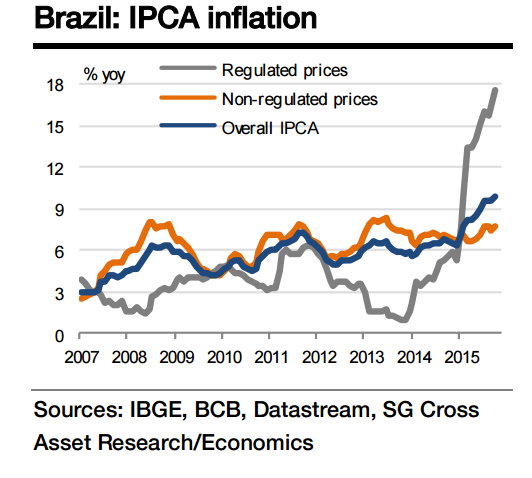Releases through October suggest that inflation has continued to accelerate this year, save for one or two monthly pauses. The full-month inflation number rose to 9.93% yoy in October, led primarily by further adjustments in transport prices. In fact, barring education, each of the nine major components showed inflation acceleration beyond their respective seasonal trends (or their respective monthly rates in 2014 and in 2013). Based on this pattern, inflation should rise to nearly 10% in November prompting to forecast mid-month inflation at 9.94% yoy.
"We are unlikely to see a fall in inflation until January 2016 when the base effect of regulated price adjustments ends. Inflation should then subside throughout 2016", notes Societe Generale.
On average, the bulk of the upside surprises over the past few months has been driven by a higher-than-expected rise in food prices, a rise in health and personal care inflation and continued adjustments in housing and transport prices. Notwithstanding anticipated inflation moderation given the base effect, we should see a lagged pass-through impact in several price categories due to the extent of BRL depreciation and continued pressure on the currency from the fiscal situation. This lagged impact is also the key upside risk to the medium-term inflation outlook. As a result, there are still considerable upside risks to the 2015 and 2016 annual inflation forecasts of 8.8% and 6.6% respectively.
While the effect of slow growth and labour market deterioration could lead to a more severe slowdown in inflation next year, both the current trajectory and recent history give little ground for confidence in this regard. Inflation will likely remain above the BCB's target ceiling (6.0%) over the medium term.
Brazil inflation acceleration continues to surprise; moderation to begin in January 2016

Thursday, November 19, 2015 12:23 AM UTC
Editor's Picks
- Market Data
Most Popular
3



 Best Gold Stocks to Buy Now: AABB, GOLD, GDX
Best Gold Stocks to Buy Now: AABB, GOLD, GDX  Gold Prices Fall Amid Rate Jitters; Copper Steady as China Stimulus Eyed
Gold Prices Fall Amid Rate Jitters; Copper Steady as China Stimulus Eyed  FxWirePro: Daily Commodity Tracker - 21st March, 2022
FxWirePro: Daily Commodity Tracker - 21st March, 2022 






























